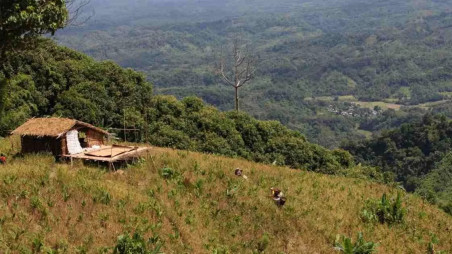Why Kuki-Chin National Front raising tensions in Ctg Hill Tracts?
- Update Time : Tuesday, November 26, 2024

TDS Desk:
The Kuki-Chin National Front (KNF), which evolved from the Kuki-Chin National Development Organisation (KNDO), has become a growing force in the Chittagong Hill Tracts, calling for the establishment of an independent state for the Kuki-Chin ethnic groups.
The KNDO, founded in 2008 under the leadership of Nathan Bawm, originally aimed to address the rights and interests of six small ethnic communities—Bawm, Pangkhua, Lusai, Ghumi, Mo, and Khiang—living in the mountainous areas of Bandarban and Rangamati.
The terrorist group’s early efforts focused on advocating for peace, harmony and the resolution of grievances through dialogue with the Bangladeshi government, according to information provided by official sources.
However, after years of unfulfilled demands, the KNDO transformed into the Kuki-Chin National Front in 2016, adopting a more militant approach with the formation of its armed wing, the Kuki-Chin National Army (KNA).
According to the officials, the KNF now seeks the creation of a separate Kuki-Chin state, Kukiland, and aims to restore their ancestral lands, removing the presence of what they term as “armed terrorists” from the area, referring particularly to the United People’s Democratic Front (UPDF) and the JSS factions.
The group’s activities have escalated over the years, moving from advocacy to armed conflict.
The KNF’s key goals include the re-establishment of the Inner Line Permit (ILP) system, a relic from British colonial rule that required non-indigenous people to obtain special permission to enter the Chittagong Hill Tracts.
The ILP was seen as a protective measure for the indigenous populations and their lands.
The KNF’s rhetoric often frames their struggle as reclamation of these territories, alongside the repatriation of displaced Kuki-Chin people who were forced to migrate during British rule to areas such as Mizoram in India and Chin State in Myanmar.
In recent months, the KNF has engaged in increasingly violent confrontations. On April 2, 2024, a group of 20 to 30 KNF militants launched a daring attack on a Sonali Bank branch in Ruma Bazar, Bandarban.
The armed assailants not only looted a significant amount of money—approximately Tk 15-20 lakh—but also stole firearms, including rifles and SMGs, and abducted the bank manager. This attack was followed by another bank robbery the next day, in which the assailants made off with mobile phones and more money.
The KNF’s military activities have led to direct confrontations with Bangladeshi security forces. On April 3, 2024, and again on August 6, 2024, heavy exchanges of gunfire occurred between the KNA and army patrol teams in the Ruma zone, particularly in areas such as Jhurbarong Para and Poli Prangsha Para.
These clashes resulted in the death of an army soldier and injuries to several others. The KNF continues to strengthen its position in the region, claiming to have an army of over 3,000 personnel, despite the actual strength being estimated at 50 to 60.
The KNF’s leadership, led by President Nathan Bawm, a former Dhaka University graduate and political candidate, and Chief of Staff Upa Vanchung, has vowed to continue their struggle for a separate Kuki-Chin territorial state. The group’s operations include elite units such as the “Head-hunters,” a commando squad that has earned notoriety in their violent engagements.
The presence of the indigenous Kuki-Chin community in the Chittagong Hill Tracts has often been overshadowed by the larger Bengali-dominated political landscape.
The KNF claims that their actions are in response to years of neglect and marginalisation, with the government’s inability to address their demands. The region, known for its ethnic diversity, has long been a site of tension between indigenous communities and the Bangladeshi state.
As the conflict deepens, the future of the Chittagong Hill Tracts remains uncertain. The government has expressed concern over the increasing violence and its impact on the region’s stability.
With the Kuki-Chin National Front resolute in its goals, the road to peace appears distant, as the KNF pushes forward in its quest for autonomy and the establishment of Kukiland.
When asked about the rising tensions in the Chittagong Hill Tracts linked to the activities of the Kuki National Front (KNF), security expert Brigadier General (retired) Md Abdul Hamid highlighted that the KNF issue has transcended national boundaries.
He said the group is reportedly active in India, Myanmar, China and Bangladesh. In addition to recent operations in Bangladesh’s Bandarban region, they have carried out significant attacks in India’s Manipur state, resulting in substantial loss of life and resources.
The KNF is also reportedly advocating for an independent Kuki state, which Brig Gen Hamid views as a reflection of broader regional dynamics influenced by global powers.
He said that addressing this issue requires a comprehensive strategy that considers the geopolitical landscape, emerging trends, and potential scenarios.
This approach must include continuous dialogue with key stakeholders, including global powers such as the USA, UK, and EU, as well as countries directly involved in the matter, like India, China, and Myanmar, Abdul Hamid said.
Brig Gen Hamid stressed the need for using both soft and hard power by working together with politicians, civil society, NGOs, and the Bangladesh Armed Forces.
He also highlighted the importance of active diplomacy, especially through discussions with India and Myanmar, to tackle the challenges of the Kuki-Chin displacement and reduce the chances of regional instability.













